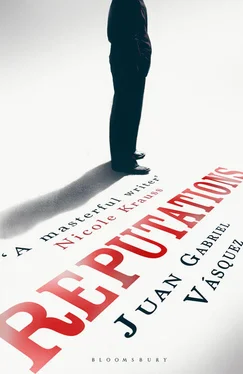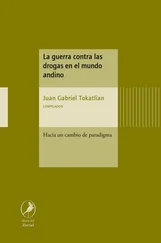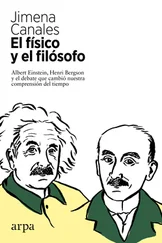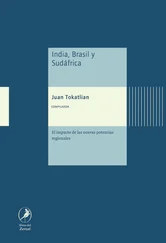There, stuck in the little crowd that was going to cross the street, he thought about what was about to happen. Maybe Rodrigo Valencia was right and all this was a mistake, a regrettable mistake, the worst Mallarino could commit in his life. Maybe his prediction was correct: if he carried on with his intentions, if he went inside the travel agency with Samanta and talked to Cuéllar’s widow or listened to Samanta, he would find a transformed world when he left: a world (a country, and in the country, a city, and in the city, a newspaper) in which Mallarino would no longer be who he was now. After this conversation, no matter what it might contain, whatever might be said, the army of his enemies would come down on him without pity. Jackals, they were all jackals, who had spent their lives waiting for such a declaration of vulnerability. Because they would find out, of course they’d find out: whatever the conversation might contain and whatever might be said. It didn’t matter what revelations came out in Cuéllar’s widow’s office, and it didn’t even matter if there were any revelations at all, if the woman sent them away amid shouts and slaps without telling them anything new, or if she refused to speak, if she wielded the terrible revenge of silence: the silence that hurt Samanta so much, that for her would be the worst affront, the most distressing humiliation. All this was, in some measure, a humiliation for Samanta; but going through anxiety and daring and the affronting memory only to run up against silence would be the worst humiliation of all.
And even if it turned out that way, the jackals would find out and launch their attack. The important thing for them, thought Mallarino, would not be what happened in the past, but the cartoonist’s current uncertainty and what that uncertainty revealed. They would also humiliate him, and that was all they’d need to humiliate him: the question would be enough, the simple question that was perhaps already forming on Samanta’s tongue, that perhaps Samanta had been practising all day, choosing the words and the intonation, even choosing the expression on her face to not look more defenceless than necessary. Choosing her clothes, thought Mallarino, yes, Samanta had surely selected her outfit thinking of the question she was going to ask the widow of a dead congressman. For her there could be a variation of results, one possibility among many or at least among two; not for him, for, no matter what happened at the Unicorn travel agency, Mallarino would encounter on his way out his enemies of forty years pointing at him, egging on a crazed mob ready to judge him summarily and burn him at the stake, the stake of changeable, capricious public opinion. Mallarino the slanderer or simply irresponsible, Mallarino destroyer of a man’s life or simply unpunished abuser of the power of the media. Now he better understood what had happened twenty-eight years ago, when he’d given himself the pleasure of humiliating Congressman Adolfo Cuéllar; he understood the fervour with which the public had received the humiliation, that fervour disguised as indignation or condemnation. He had simply set the mechanism in motion, yes, he had lit the fire and then warmed his hands at the flames. . Now it was his turn. It didn’t matter who had right on their side. Justice and injustice didn’t matter. There was only one thing the public liked more than humiliation, and that was the humiliation of a humiliator. That afternoon Mallarino was arriving to give them that pleasure. What the dead man’s wife said would make no difference whatsoever: if he decided to go inside Unicorn Travel, Mallarino would no longer have the moral authority he had at that moment but would become a cheap rumour-monger, a sniper of other people’s reputations. Someone like that cannot be out on the loose. Someone like that is dangerous.
And now the light turned red and the traffic stopped and Mallarino could cross the street, cut through that heavy heat that forms like a cloud in front of a line of cars at a Bogotá traffic light. ‘Samanta!’ he shouted from the corner like an impatient child. But he was fifty steps from her, fifty steps from Unicorn Travel and the door that would change his life, and he could not be expected to be patient, he couldn’t be expected to wait till he’d covered that distance before declaring his presence to Samanta Leal. ‘Samanta!’ he shouted. She raised her head and turned in the direction of the shout and saw him; she lifted a timid but content hand, waved it in the air at first slowly and then enthusiastically, and something lit up in her face; and Mallarino thought that not even two days ago — the night of the ceremony, at the bar of the Teatro Colón, with a piece of plastic stuck on her little girl’s tongue — had he seen her look so lovely. And if he could go back to the night of the ceremony, the glory of the speeches and the medals and the pats on the back? If he could, would he? No he wouldn’t, thought Mallarino, and he was surprised to find himself thinking that. Again Rodrigo Valencia’s words appeared in his head, those impertinent words: What good will it do? What good is ruining a man’s life, even if the man deserves ruin? What good is this power if nothing else changed, except the ruin of that man? Forty years: everyone had been congratulating him lately, and only now had Mallarino realized that his longevity was not a virtue, but an insult: forty years, and nothing around him had changed. I beg not to be taken home : Mallarino peered at the phrase as one peers at a puddle of dark water, and thought he saw something glistening at the bottom. Again he thought of the homage; he thought of the stamp, of his own face looking out of the frame at him with its ferocious serrated edges. All that was far behind him now, very far: here, on this pavement on Seventh Avenue at this hour of the Bogotá afternoon, all that began to form part of his memory, and could be forgotten. Would Mallarino manage to? The memory has a marvellous capacity to remember the forgotten, its existence and its stalking, and thus allow us to stay alert when we don’t want to forget and forget when we choose to. Freedom, freedom from the past, that’s what Mallarino desired above all now.
There was no longer anything tying him to the past. The present was a weight and a nuisance, like the addiction to a drug. The future, however, belonged to him. It was all a question of seeing the future, of knowing how to see it clearly and divest ourselves for an instant of our propensity for deceit, the deceit of others and of ourselves, for the thousand lies we tell ourselves about what might happen to us. It is necessary to lie to ourselves, of course, because no one can stand too much clairvoyance: how many would want to know the date of their own death, for example, or foresee illness or misfortune? But now, arriving to meet Samanta, seeing her so lovely in her turquoise sweater, so solid against the blurry background of shop windows and their reflections, her mouth half open as if singing a secret song, Mallarino suddenly understood that he could do it: he understood that, even if he had no control over the unstable, volatile past, he could remember with total clarity his own future. Is that not what he did each time he drew a cartoon? He imagined a scene, imagined a character, assigned him features, wrote in his head the epigram that would be like a stinger dipped in honey, and after doing this he had to remember it to be able to draw it: none of that existed when he sat down at his drafting table, and nevertheless Mallarino was able to remember it, had to remember it to put it down on paper. Yes, thought Mallarino, the White Queen was right: it’s a poor sort of memory that only works backwards.
And then, in a lightning flash of lucidity, he remembered himself returning that very evening to his house in the mountains, climbing the stairs to his studio, sitting down in his chair, and he remembered exactly what he will do. He will glance over the cuttings pinned up on his corkboard: the Colombian President, the Latin American liberator, the German Pope. He will turn on the lamp and take a sheet of headed notepaper out of the filing cabinet and will pick up his fountain pen and write today’s date, and under the date the name Rodrigo Valencia. By means of this letter (that’s how you say it, isn’t it? So as to be formal and pretty, I like things to be well presented) I wish to notify you of my unconditional resignation (a little dramatic, I know, but that’s how it is, what can we do) from the newspaper that you, with such good fortune, have published during recent years (fewer than the number that I have spent drawing cartoons, it must be said). I take this decision after long and intense consultations with my pillow and other authorities, and hasten to emphasize that my decision, as well as unconditional, is irrevocable, definitive and all those long words. So, don’t bother wearing yourself out, brother, you’ll get nothing by insisting. He will go to the kitchen for a large plastic rubbish bag, black with an orange band, and begin chucking into it bottles of ink, blades, his pencil holder (the cut-off end of a rain stick) and with it charcoals, seven different kinds of leads, an unused spatula and a collection of nibs and brushes, well combed like the members of a school choir, and all will end up at the bottom of the bag. One by one, Mallarino will take the drawers out of his filing cabinet and empty them into the bag, and he will enjoy the sound of paper falling in cascades to the bottom, the static produced by the friction with the bag. He will pull off the skinny liberator and the haggard Pope, the recently elected President and recently killed guerrilla, and throw them in the bag. He will take two steps back, will look at the empty spaces appearing in the wake of his hand, clearings opening up in the middle of the dense jungle. He will take the slogan about the stinger and honey down off the wall and put it in the bag. He will take Daumier’s caricature down and put it in the bag.
Читать дальше












